Abstract
- Revolution has been taking place in the technology sector.
- Information and knowledge are thus important in this sector.
- Technology is important in the business world.
- It should be incorporated into learning.
- School leadership should focus on improving technology in schools.
- This will enhance the utilization of modern technology.
Currently, a revolution is taking place in the technology sector. With this technological revolution, information and knowledge are considered critical assets to every organization. Technology is considered as a very crucial business tool as it cuts across all sectors in the economy. In this case, many regard technology as a subtle tool for enhancing the effectiveness of various societal systems. For instance, in education systems, the integration of ICT technology may aid in shifting learning from the teacher-centered perspective to the student-focused perspective in an incredible way. However, this milestone that was achieved through the ongoing technology revolution is to be maintained through appropriate leadership skills. In most cases, leadership requires the ability to do more than one thing well.
In this context, integrating ICT technology into learning coupled with teaching calls for school leaders to focus their strategic leadership efforts on organizational improvement. Arguably, this process requires technology leadership. In this perspective, this paper seeks to determine the applicability of leadership laws. This includes those postulated by John Maxwell in his book “The 21 Irrefutable Laws of Leadership” in aiding to facilitate the incorporation of ICT technology in the sector of teaching and learning among the other various sectors. Leadership within technology constitutes one of the essential issues that may result in effective implementation of ICT technologies in schools. The advancement of technology in the education sector has its impact felt far and wide. However, it is the sole responsibility of school leaders to provide the required guidelines and stipulations, which will enable maximum utilization of the modern technology.
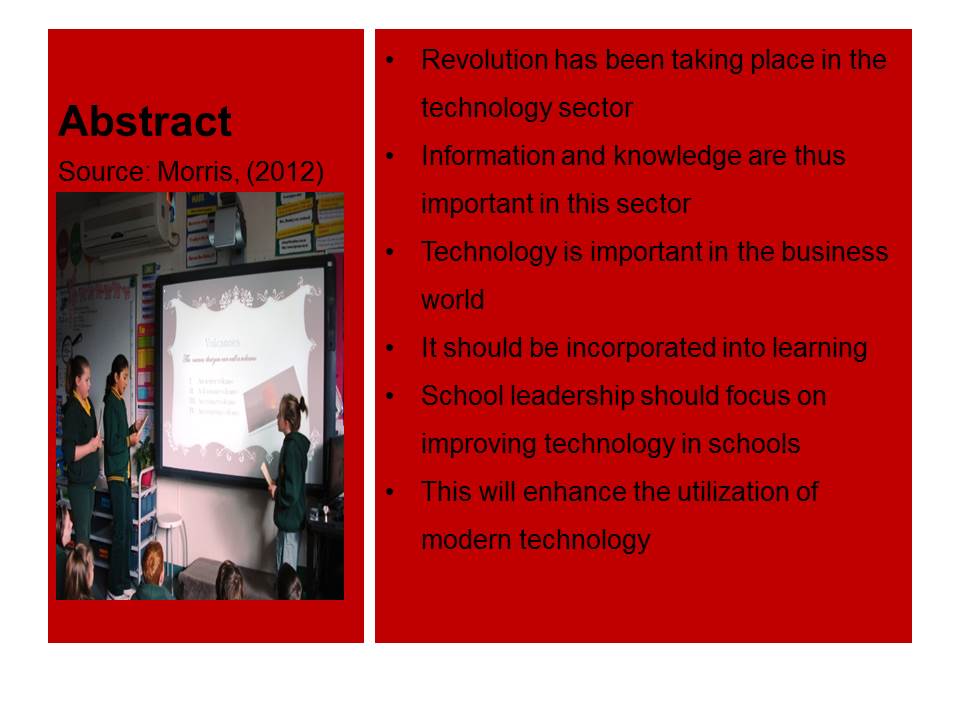
Technology in management
- Technology refers to the use of systems to solve problems.
- It affects human species.
- It can be used in medicine, construction, and ICT (Byrappa & Ohachi, 2002).
- It has helped in improving the economy.
- Critics of technological development claim that the technology causes alienation.
- Others say it is beneficial to the human condition.
- Scientists claim technology is being used by pirates.
- Technology in institutions is essential.
- Leaders should work towards its implementation.
- Top management should take responsibility in this initiative (Noorbergen, 2001).
- Managers should lead people to achieve organisational goals (Griffin, 2012).
- Managers ensure proper utilization of resources.
- They direct, control, organize and plan.
- Leadership aids in the implementation of technology.
- School leaders should lead the implementation of technology.
- They should lead the change in schools (Kozma, 2005).
- ICT technology leadership aids in the implementation (Hinostroza, Guzmán, & Isaac, 2002).
- Leadership is very critical to every aspect of life.
- It ensures long term improvements.
- Leaders should work to enhance skills (Maxwell, 2007).
- ICT integration in schools differs from the Maxwell leadership approach.
- The approach should be integrated into ICT leadership.
- The objective is to evaluate the impact of leadership in ICT.
Technology is regarded to as the modification, knowledge and usage of skills procedures, systems, and methods in order to solve a problem; enhance the existing solution to the problem or accomplish a certain function. Technology mainly affects the human species and their capacity to control the environment in general. Technology has a broad spectrum mainly associated with construction technology, medical technology, and the information communication technology (Byrappa & Ohachi, 2002). Technology has its roots in the conversion of natural resources into simple tools. Since then, technology has affected society and the surroundings in a great way. In many societies around the world, technology has assisted in the development of their economies. The major detriment with the ongoing technology revolution is the unwanted by product often referred to as pollution. In this case, pollution is known to deplete the natural resources thus negatively affecting the environment. Over the years, there have been some ethical questions in regards to technology. However, debates are here to stay on whether the technological advancements enhance or improve the human condition or only worsen it. Many of the criticisms revolve around the issue of pollution since the technology depletes the natural resources and the environment in general. In addition, critics claim that technology alienates people.
This implies that technology leads to people segregation with the notion of self fulfillment. On the other hand, those proposing for the technological advancement claim that the continued progress is beneficial to the human condition. Until recently, technology was restricted to the human race. However, scientific studies claim that other pirates are taking up the problem solving technique. For instance, the dolphins have learned how to pass knowledge to other generations.
Thus, it is evident that, for essential implementation of technology in the current institutions, leadership is of key essence. In the highly modernized society, individuals often regard technology as the use of computers to accomplish tasks. This might be considered as ignorance by the elite in society. It can also be defended by the fact that the pivot point of technology revolves around the crucial issue of computerization. However, it is common for the top management in many organizations to leave the implementation of ICT to middle level management. This is caused by various factors mainly including the fact they consider ICT just as another department thus failing to take heed of its vast potential. There also exists the general assumption that the investment in ICT is exorbitant. The sophistication that comes with advanced technology will most likely elude the top management (Noorbergen, 2001). In many scenarios, the ideas of middle level management to indulge in advanced technology will elicit confused reactions from the top management. In this case, the top level management still considers some form of technology advancement as laziness.
Management refers to the ability to get people together and work in unison to accomplish a desired goal (Griffin, 2012). Management entails the utilization of scarce resources in an efficient manner so that the stipulated goals are met. Under the scope of resources, the technological resources, human resources, financial resources, and natural resources are put into consideration. In management, there are some key aspects that are often under close consideration. They include planning, organizing, staffing, directing, and leading. Essentially, leadership implies the process of social influence in which one person aid and directs others to accomplish a certain goal.
In the world of academia, remarkable milestones have been achieved as a result of embracing technological change and ensuring it is properly utilized and managed. In technology, leadership constitutes one of the essential issues that may result in effective implementation of ICT technologies in schools. The responsibility of this leadership falls in the realm of school leaders who include the head teachers. School leaders have a noble role to lead organizational change through setting of visions, objectives, and initiatives of developments that deploy ICT to induce pedagogical changes within schools (Kozma, 2005). However, it is the role of an individual in the various learning institutions to try and utilize the key resource.
The heads of the academic discipline should be aware that they are bestowed with the key responsibility to initiate the change. This can only be achieved through visionary and proactive leadership skills. This is meant to bridge the gap that can result if technology is not well managed. This argument supports the notion that, even though investment in ICT infrastructure is critical, effective ICT technology leadership is equally crucial for successful ICT project implementations (Hinostroza, Guzmán, & Isaac, 2002). Consequently, strategic leadership is central in ensuring long-term improvements in schools. Essentially, the negation of technology leadership reduces the utilization of most of the time available for school leaders in making decisions on heavy investments in ICT infrastructures, as opposed to the integration of the school curriculum with the technology. The implication here is that leadership comes second after investment in technology. This opposes the Maxwell’s law of leadership that claims that excellent leaders work on a daily basis enhancing their leading skills (Maxwell, 2007). There are some differences between the approach of ICT technology integration in schools and Maxwell’s approach to leadership. As a result, several scholarly researches have been conducted on whether incorporation of Maxwell’s approaches to leadership in ICT curriculum integration in schools may help in making the ICT leadership a continuous process, as opposed to being intermittent in Australian schools.
Within the last decade, a gap has existed in the ICT support and leadership within schools. Head teachers have shunned away from taking proactive roles in the leadership of ICT technologies within schools. Instead, they have left this noble role to be accomplished by small groups of teachers together with people falling in the realm of middle management. The main objective of the study was to evaluate the impact of leadership in technological enhancement. The study narrows down to the technological advancements that have been integrated in the education sector over the years.
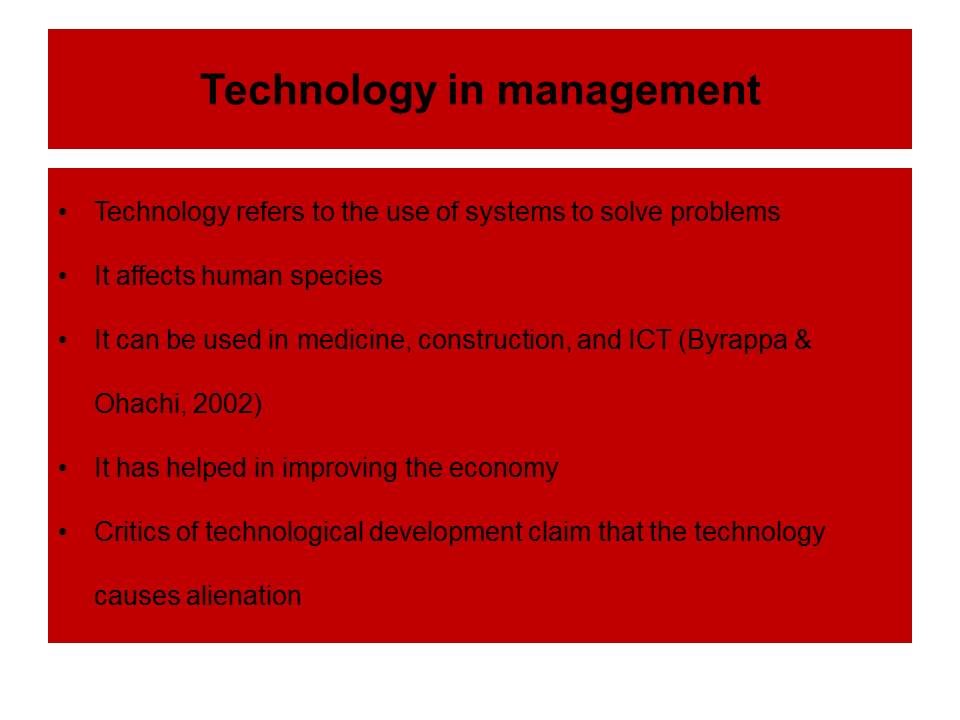
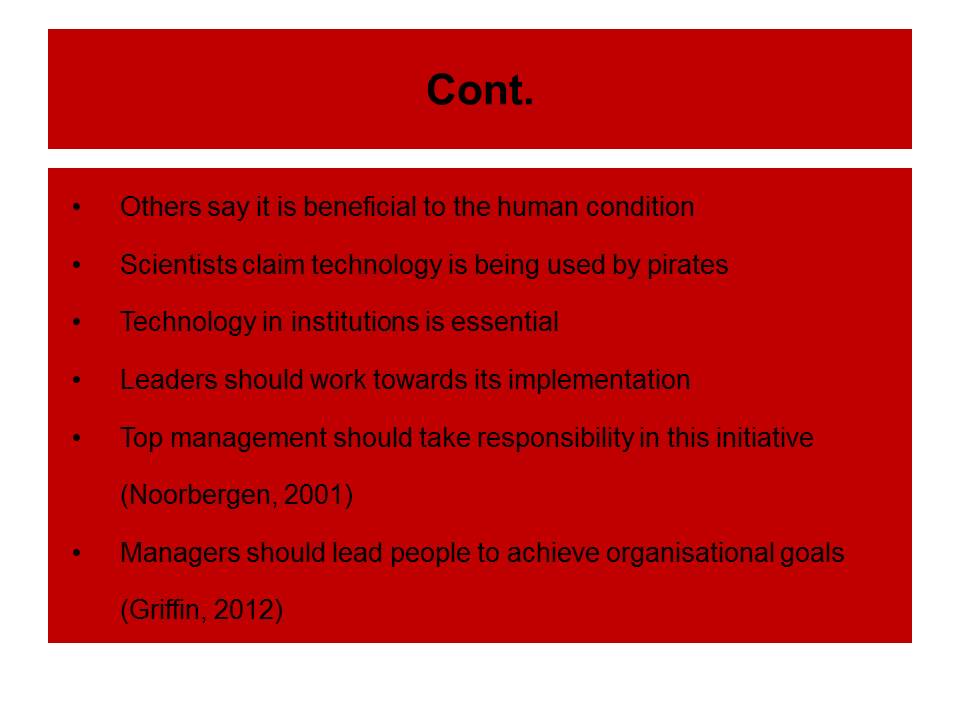
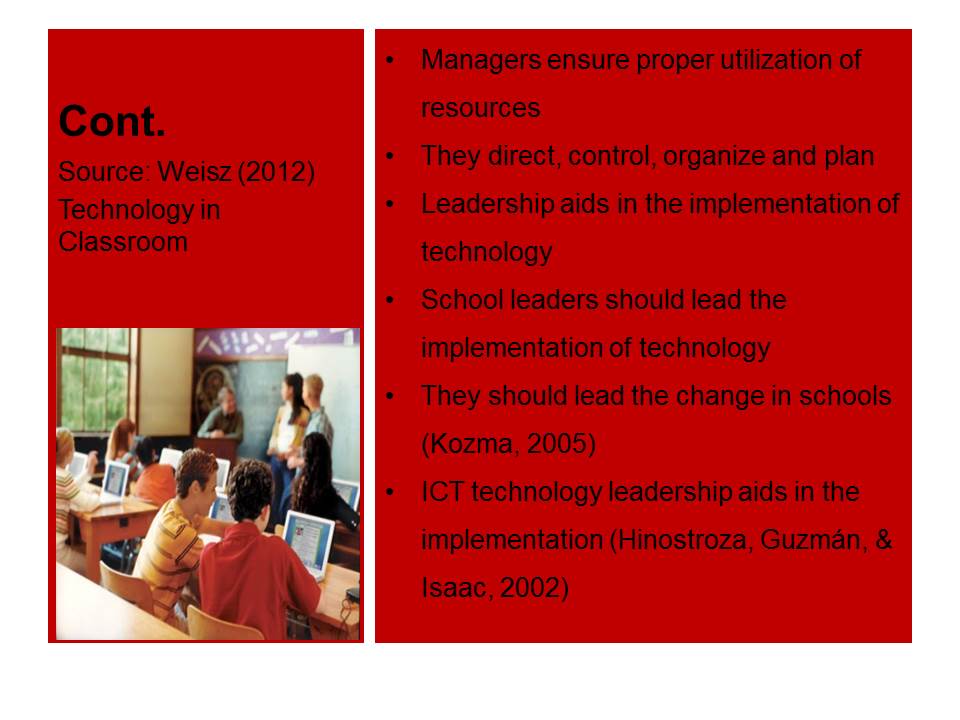
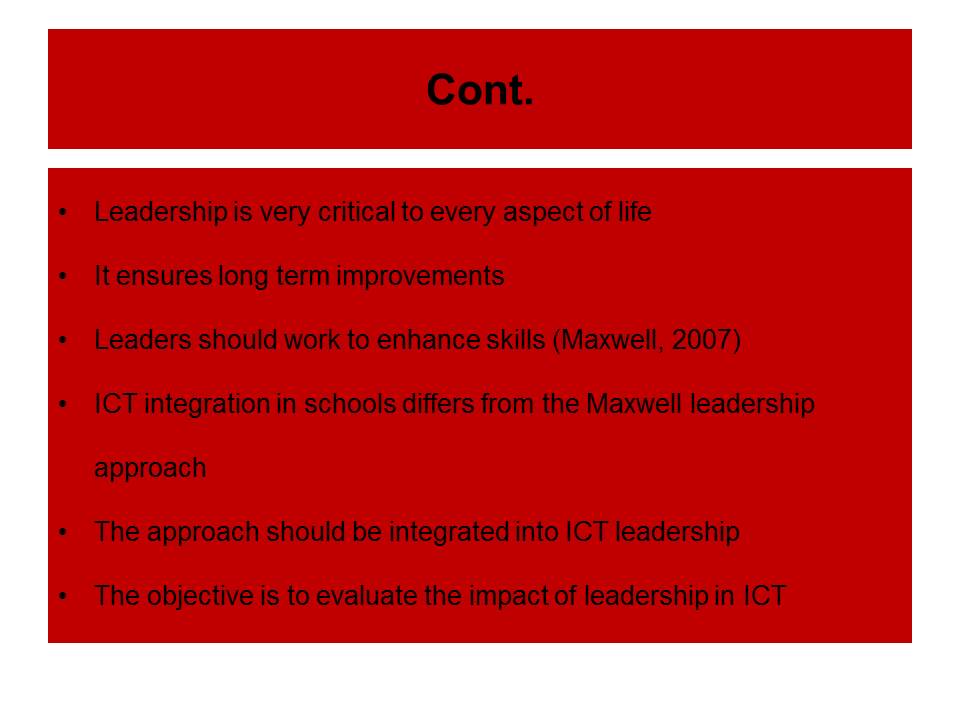
Materials and methods
- The data will be collected from schools in Australia.
- It is based on existing code between ICT integration in learning, teaching, and leadership of Australian schools.
- Interviews will be conducted.
- Various participants will take part in the study.
- Participants will be from governmental and non-governmental schools.
- The interview focuses on school leaders.
- Questions accounted for Maxwell laws of leadership.
- Key words are ICT and school curriculum.
- Responses were to be typed using computers.
- The computers were provided.
- Computers were linked to interviewer database.
- Data was stored in the database for analysis.
- The foundation of the research was that top-down leadership is not necessary.
- Constrains to the research include time and finance.
- Mechanisms for evaluation are important.
- The researcher created data to test the system.
- This was to ensure debugging before the actual data processing.
- Preparation of research tools.
- This includes availing computers and other tools.
- The activity took two days.
- Collection of data was the most essential activity.
- Participants gathered at a central place.
- Analysis and report preparation was to be done within a month.
The main approach or procedure of this research was to gather data based on the existing code between ICT integration in learning, teaching, and leadership of Australian schools. In this endeavor, the research conducted focused-group interviews on the strategies of leadership adopted by various school heads on the deployment of ICT in influencing and enhancing teaching and learning. The participants of the research were drawn from both governmental and nongovernmental schools in Australia. These participants included leaders of education in schools. The focused-group interview questions were designed in such a way that they took into account the twenty-one proposed laws of leadership postulated by Maxwell in his book “The 21 Irrefutable Laws of Leadership.”
Printed interview questions had the key words “ICT” and “school curriculum” to orient the mind of the interviewee into the focus of the research. The subjects were then requested to give a response to these questions by typing responses using computers provided to them. These computers are linked to the database of the interviewer where the responses are stored for subsequent analysis. This research project was laid on the foundation that, for the success of any change in schools’ leadership, leadership employing the top-down approach is not necessary.
Several factors, including time and financial constraints, will act as constraints for this research. Here, it is crucial to define and schedule research activities with anticipated completion dates. It is necessary to provide mechanisms of evaluating the process of the research. This ensures that appropriate strategies are taken when certain activities lag behind the anticipated time of completion. The first activity is preparation and coding of interview questionnaires. This activity is expected to take three days due to the extra task of printing. The next activity is the preparation of a database for gathering the data. There is the need to evaluate the effectiveness of the developed database so that no bugs may affect the data processing. Therefore, ardent time is required to execute this noble activity. This activity will take two weeks.
During that time, the researcher created data to test the data processing system so that debugging could be done before the actual data was processed using the system. The third activity was to prepare and avail the research tools including computers. These tools were readily available within various schools in which the focused groups were gathered to take part in the research process. Consequently, the activity took two days. The most essential activity was the collection of data. Since all participants were invited to assemble in a central place, data collection could be done within a day. Lastly, data analysis and preparation of the report of the research was to be conducted within a month.
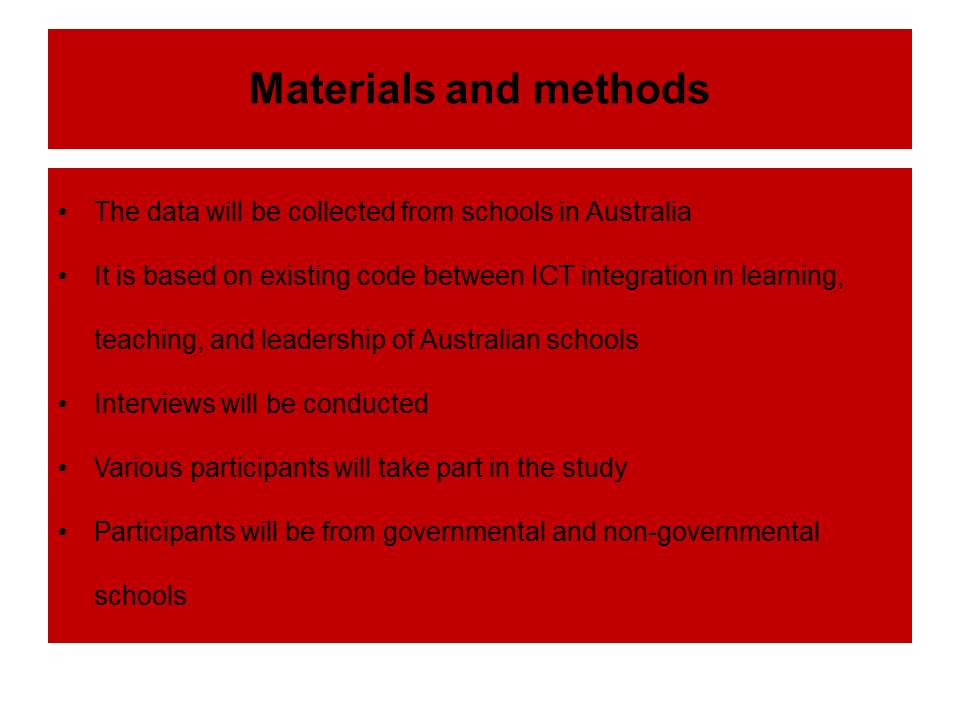
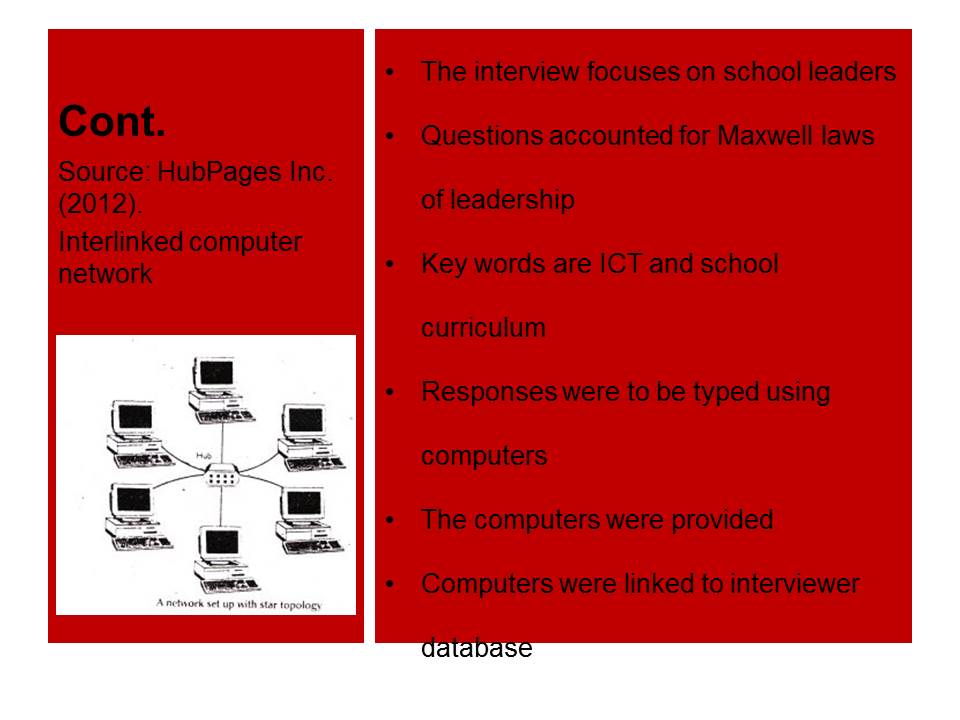
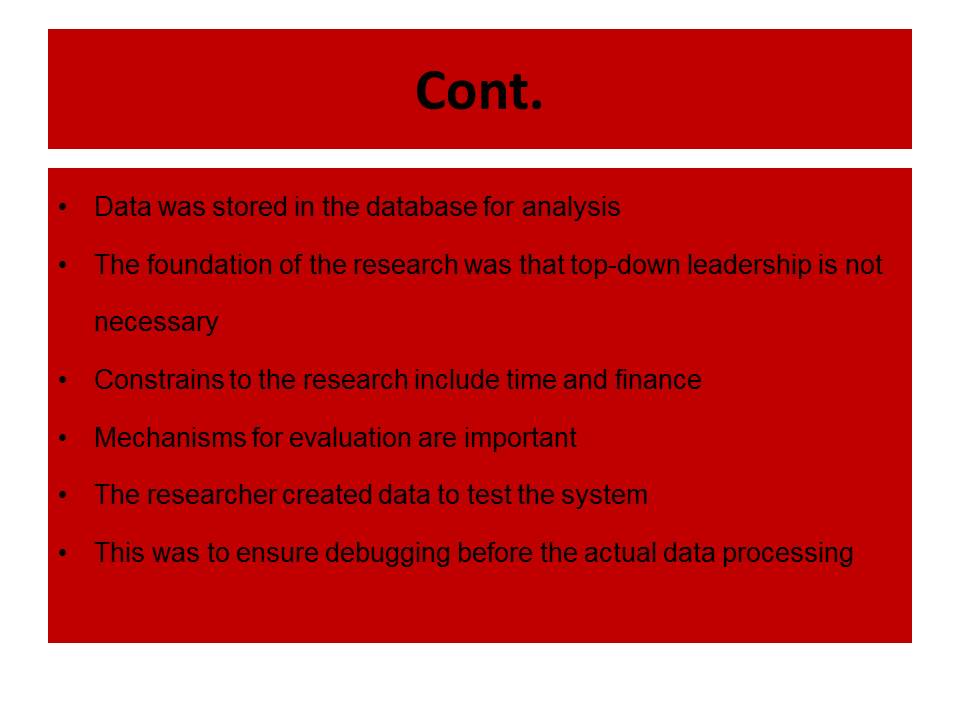
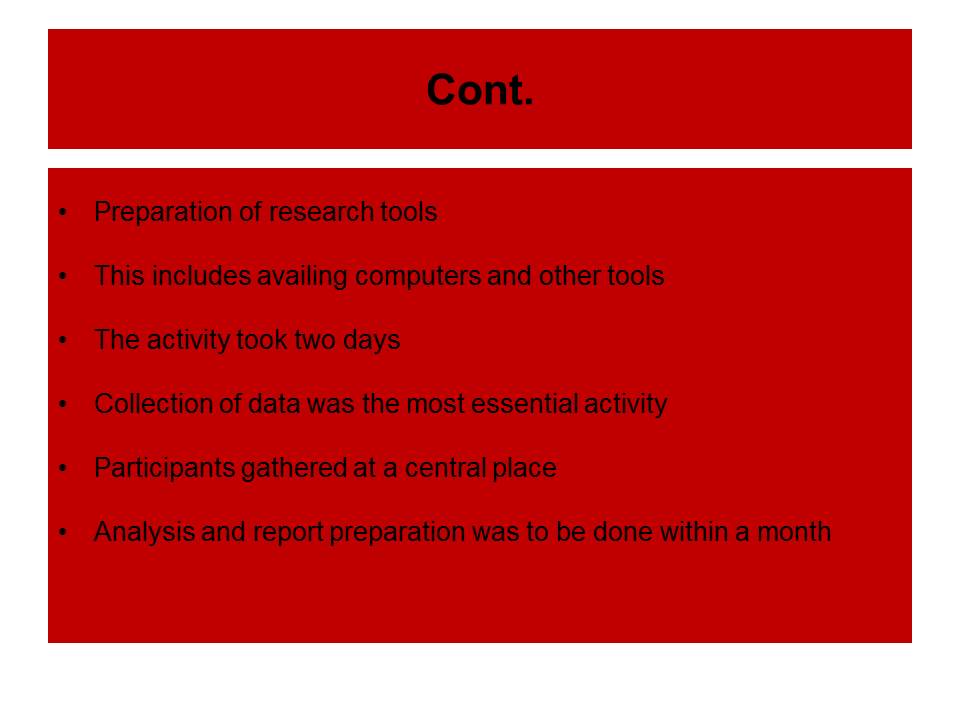
Data analysis and results
- The research was valuable.
- ICT would facilitate change in Australian education.
- The results showed a link between Maxwell laws and curriculum.
- School heads should ensure ICT implementation.
- Leadership has an influence on school curriculum.
- Inner circles would enhance leadership in schools (Akbaba-Altun, 2006).
- This will help teachers change their attitudes.
- Teachers were involved in the process.
- Leadership will help in ICT integration.
It has been deduced that the research was valuable. In this case, it gave different paradigms of facilitating change in schools through the exploitation of the advantages resulting from the full integration of ICT in Australian educational curriculum. Notably, the research may form a substantial link between the contributions of Maxwell’s law on leadership circles in helping to enhance ICT technological integration with curriculum in schools. In this context, the research has laid the premises behind the concepts of distributed leadership by school heads to ensure that teachers are engaged in the process of making ICT policies in schools. School curriculum’s rests on the approaches of network leadership besides embracing perspectives of leadership circles.
The conclusion is that teachers need to form inner circles to enhance the leadership that head teachers to give in the integration of ICT technology in the curriculum. In this regard, adoption of concepts of inner circles would disband the existing hierarchical structures that have existed in school’s leadership approaches, particularly in government schools. This way, it is possible for teachers to alter their self reliance, isolated, and silent beliefs, interaction, and pattern of altitudes to become innovative, collaborative, and adaptive in nature (Akbaba-Altun, 2006). This change is possible since teachers get involved in all aspects and processes of decision-making. This means that leadership is required to help with integration of ICT in schools.
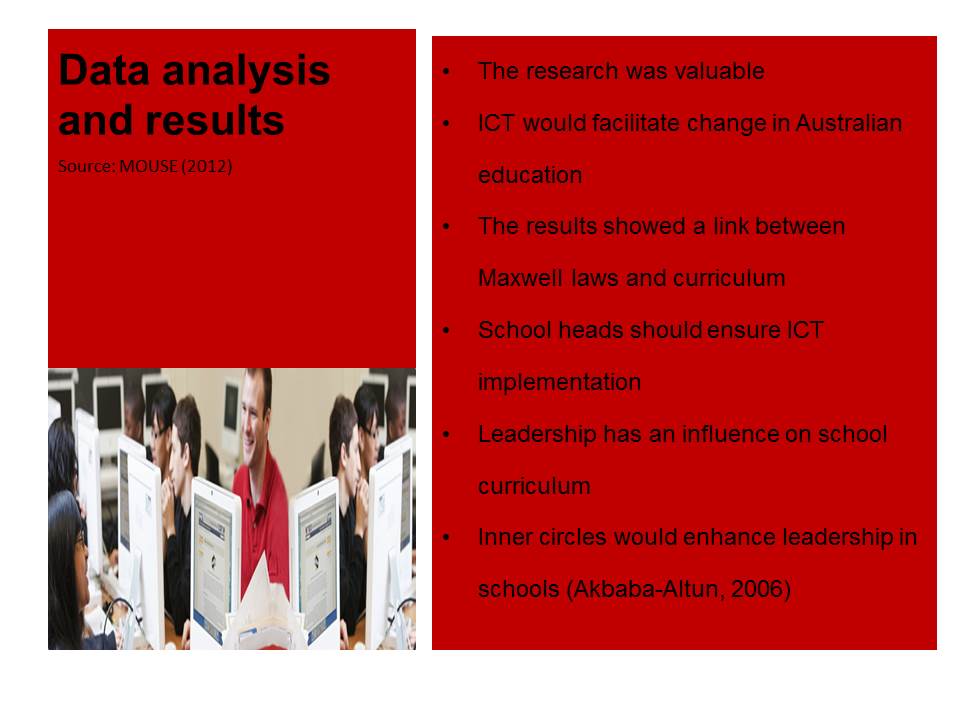
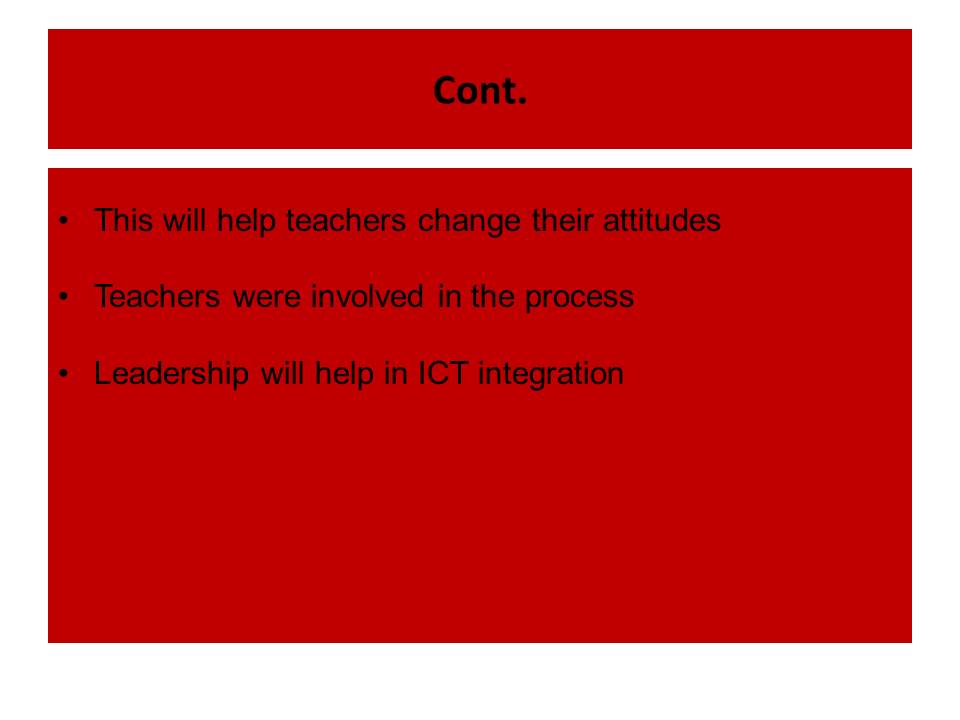
Discussion
- Leadership skills are crucial for technological advancements.
- Maxwell laws greatly aid the integration.
- According to Maxwell, the person’s ability is crucial (Maxwell, 2007).
- Leadership determines the leaders’ level of effectiveness.
- Low ability to lead signifies lower lid (Abdallah & Albadri, 2011).
- Technological advancement depends on the leader’s lid (Maxwell, 2007).
- Leadership is essential to success.
- School leaders should conform to technology for success.
- Technology facilitates transformation.
- Influence is the true measure of leadership (Maxwell, 2007).
- Managing is different from leading.
- Ability to identify opportunities is not necessarily leadership.
- Leadership title can buy a little time.
- Intelligence does not warrant leadership (Maxwell, 2007).
- Trend setting is not automatically leadership (Maxwell, 2007).
- A leader should command a following.
- Leadership is not based on position.
- A leader makes positions.
- Proof of a leader is in the following.
- Character is critical in defining leaders.
- Leaders easily build right relationships.
- They interact with the right people.
- Leaders should be able to overcome challenges.
- A leader should have the ability to achieve.
- Leadership is a process (Maxwell, 2007).
- Leaders are great learners.
- Leadership encourages individual development.
- It also develops a culture and change.
- Education can borrow much from the leadership.
- Schools have felt the impact of technology.
- Technology has much benefit to schools such as online libraries.
- Technology has improved learning process.
- It has also enhanced accuracy.
Leadership skills are crucial to attain technological advancement and maintain appropriate usage. Maxwell in his book, “The 21 irrefutable laws of leadership,” articulates certain key sentiments that would greatly aid the integration of technology in schools if they are followed. First, Maxwell explains that, for effective leadership to be attained, a person’s ability is of great concern. This is referred to as the law of the lid (Maxwell, 2007). This further explains that, a person who can decipher the law of the lid can instill effectiveness in various spheres of life. Leadership is described as the lid that determines a leader’s level of effectiveness. This implies that a low ability to lead signifies a low lid on one’s potential (Abdallah & Albadri, 2011).
Therefore, this means that the higher the lid on one’s potential, the higher the level of leadership effectiveness. With an example of McDonald’s brothers, their lid on the leadership had greatly curtailed their growth. However, after bringing in some new blood with a high lid potential, their business success story changed. Technology is no different (Maxwell, 2007). The point to note is that success can be attained with restricted ability to lead others. However, if one wanted to climb higher on the success ladder, significant and appropriate leadership will be required. This is supported by the tenet that, the greater the impact desired, the greater the influence needs to be. Maxwell clearly stated in his book that an individual who is well able to articulate leadership can attain success within any sphere in life. For many learning institutions that need to implement the new forms of technology, their leaders should first conform to the new technology. This will facilitate the transformation of the system as a whole. In the implementation of this law, Maxwell derived some guidelines for leaders. They include the listing of the major goals, assessing their leadership ability and asking for leadership ratings from colleagues.
Secondly, for an individual to be considered as a leader, he or she should be aware that influence is the true measure of leadership. With the example of the highly regarded mother Teresa, Maxwell explained that an individual has to have the ability to influence in order for him or her to be considered a leader (Maxwell, 2007). The law tries to explain that leadership can rarely be imposed or affiliated with a leadership position, it has to be earned. Under this rule, Maxwell took heed of the prevailing leadership myths or misconceptions. The management myth is a misconception that managing and leading imply the same thing. Briefly put, the only thing a leadership title can buy is a little time. This can either increase or decrease the level of influence one has on the subjects. The entrepreneurial myth asserts that an entrepreneur is not necessarily a leader. The fact that an individual can identify business opportunities does not warrant the leadership title. There also is the knowledge myth. It seeks to explain that the level of intelligence, knowledge, or IQ does not determine the leadership ability of an individual. On the other hand, the pioneer myth claims that a trend setter is not automatically a leader (Maxwell, 2007).
For one to be proclaimed as a leader, a person need not only be at the front, but should also have others come behind him following his visionary thinking. Finally, the position myth asserts that leadership is not based on position. The leadership often supersedes the position. These sentiments were confirmed by Maxwell in his book. He noted that, the position plays no part in making the leader. However, the leader is the one who makes the position. Thus, it is evident that the proof of a leader is not in good credential or lucrative titles, but in the followers. Leaders in general can be evaluated by the following basic factors. In this case, the character is critical in defining the leaders. The other factor is relationships, which is based on the fact that leaders easily build right relationships and interact with the right people. The other aspect of leadership is the experience gathered over the years. The greater the challenges faced by a leader in the past, the more likely followers will give one a chance in the present. This is also covered under past success. In this case, past success conveys great information to the followers. The other element is the ability. This is the issue of what can leaders accomplish.
The third law that Maxwell articulated was the fact that leadership is a process and not something that is attained in a day. Leadership, just like wealth and other admirable attributes, is built slowly with the passage of time (Maxwell, 2007). Leadership is compared to wealth in that it takes time to build. Successful investing does not yield success in a day’s trading. As such, leadership is no exception. This implies that the secret to successful leadership is found in the day to day agenda. If an individual continually invests in the leadership development by letting their asset compound, the results will be remarkable after some time. Comparing to investing in the stock market, hoping for immediate success is not ideal. This gradual process means that leaders are also great learners. It is the ability to develop and improve their skill that will differentiate the leaders and their followers. As a process, leadership encourages development of the individual. It makes an individual look mature. In addition, it develops a culture and changes people. Thus, this confirms the assertion that, in order to lead tomorrow, one should learn and pay the price today. Leadership is thus not attained in a day, but it is developed daily. Therefore, according to the law of processes, what a person does in a disciplined and on a consistent basis will eventually yield the desired results no matter the scope of the goal (Maxwell, 2007).
In the above three Maxwell’s laws of leadership, a lot can be deduced. The world of education has a lot to borrow from the leadership. On the other hand, schools have felt the impact technology has had on the sector. The benefits are plenty and would include technology, which has been incorporated into new products that are user friendly, popular, and inexpensive. For instance, technology has paved way to the availability of online libraries. This implies that students can gather relevant materials online. This product favors both the students and the institution in terms of convenience and affordability. Secondly, the use of technology has greatly improved the learning process. For instance, in schools, the use of classrooms or lecture rooms has been given a facelift. Teachers can now convey knowledge from the comfort of their homes or in other places thus avoiding the barrier of geographical mobility. In addition, advanced technology has been able to upgrade the level of accuracy that comes from using enhanced technology such as calculators, computers, and other practical machines in classes.
However, adopting the upscale technology also comes with its detriments. For instance, with the increased level of technology, students are exposed to all forms of information and at times, it may cause moral decay. In addition, there is the aspect of over reliance on technology that at times leaves the student stuck in its absence. Advanced technology is also prone to some health concerns. For instance, a student who does not go to class, but attends any forum because of the internet has a higher chance of becoming obese. There is also the aspect of environmental pollution that causes degradation of the environment and its natural resources (Khosrowpour, & Information Resources Management Association International Conference, 2000).
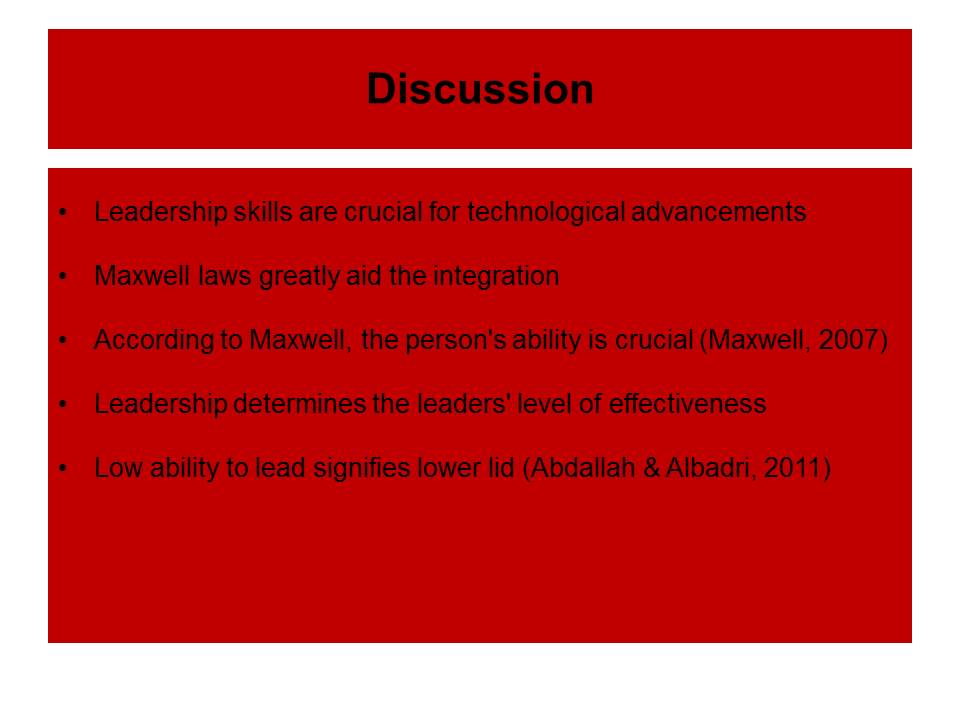
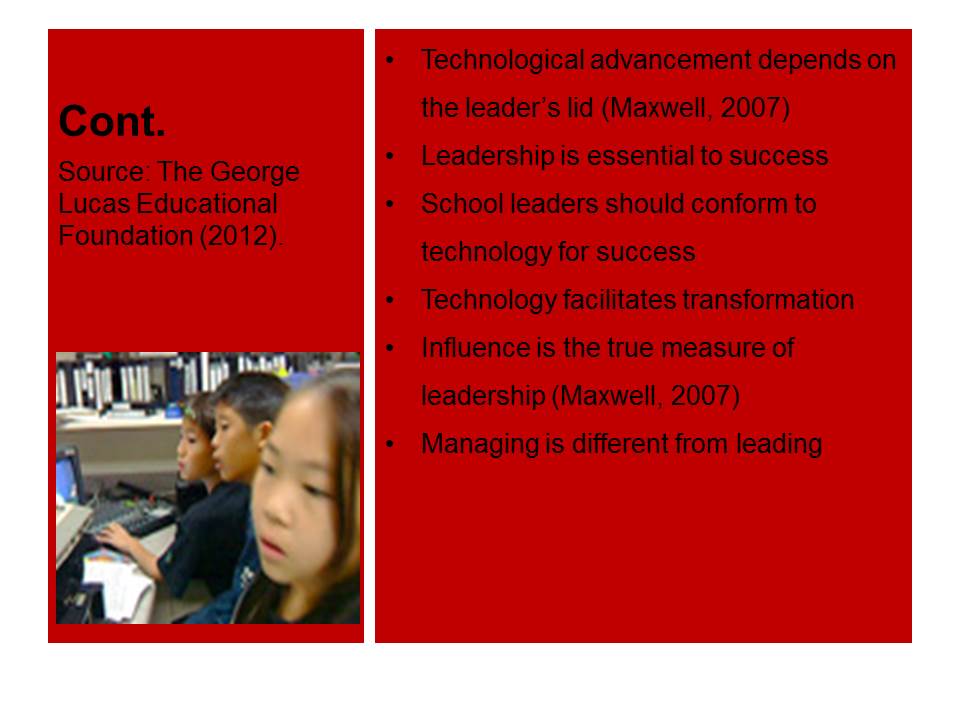
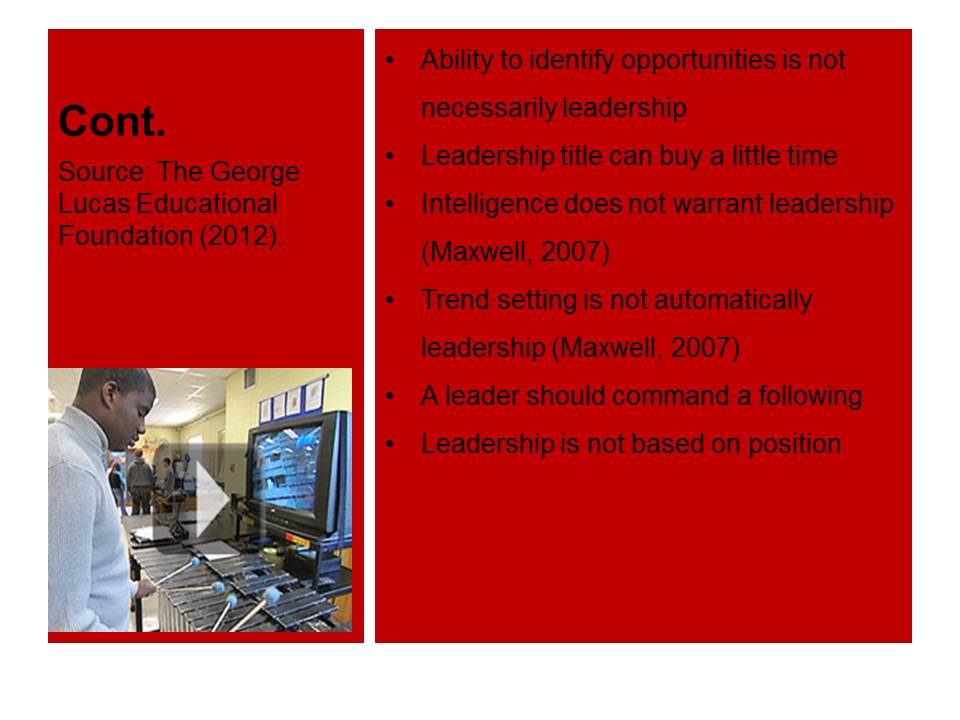
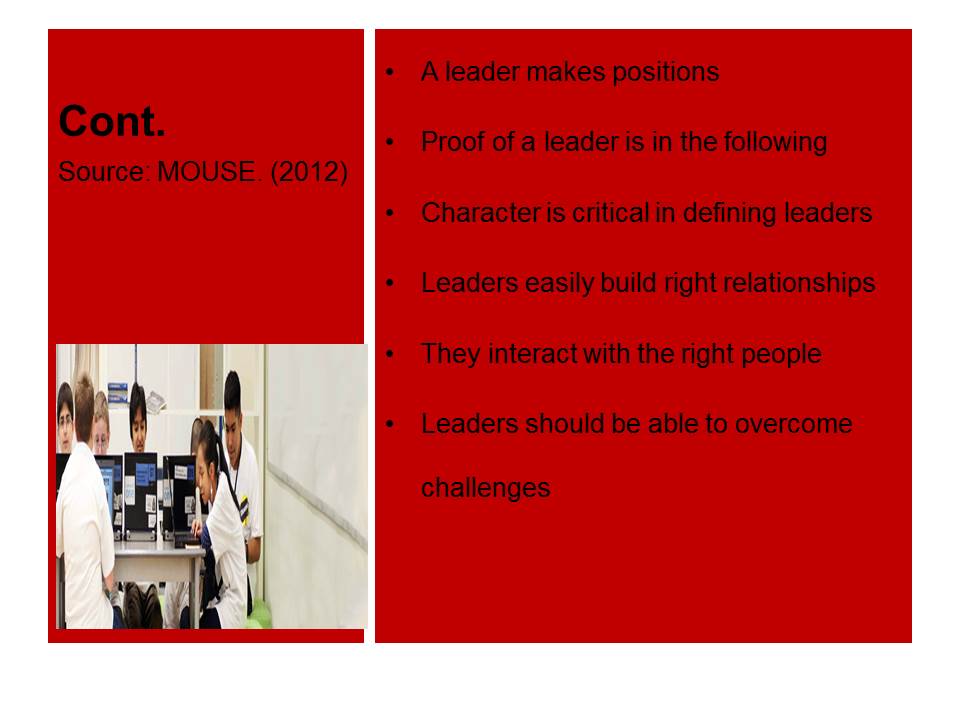
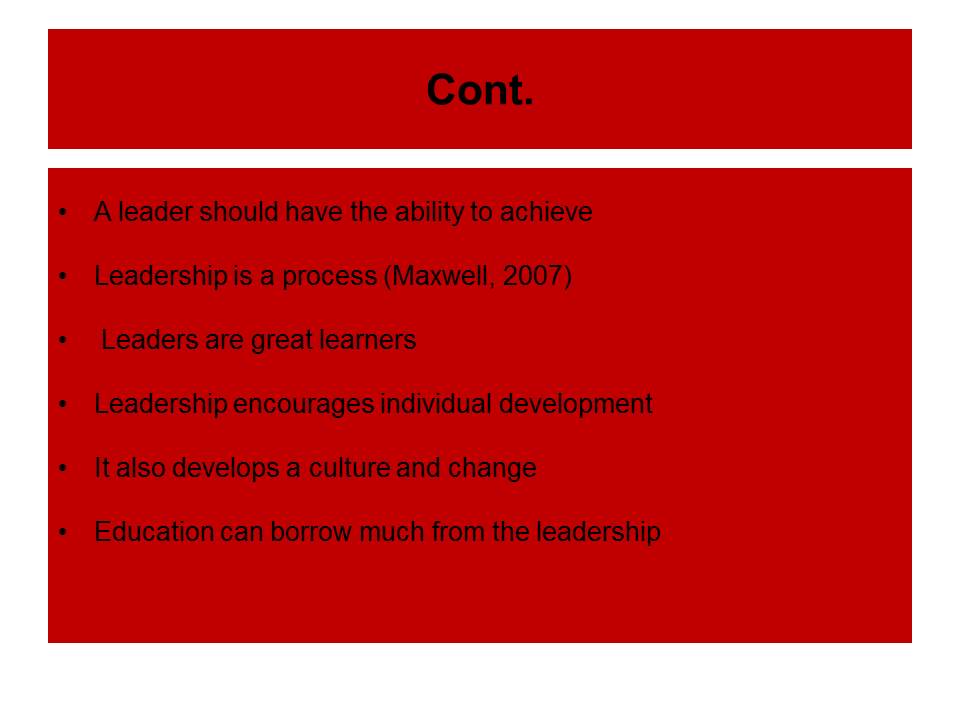
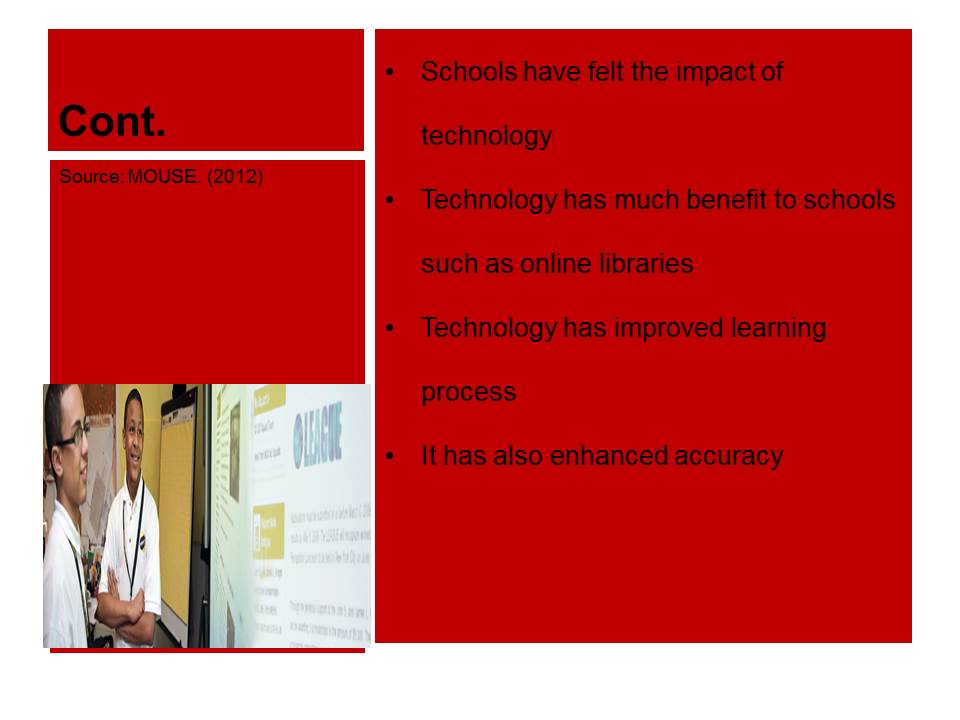
Maxwell Laws
The Maxwell laws are:
- Ability;
- Influence;
- Leadership is a process.
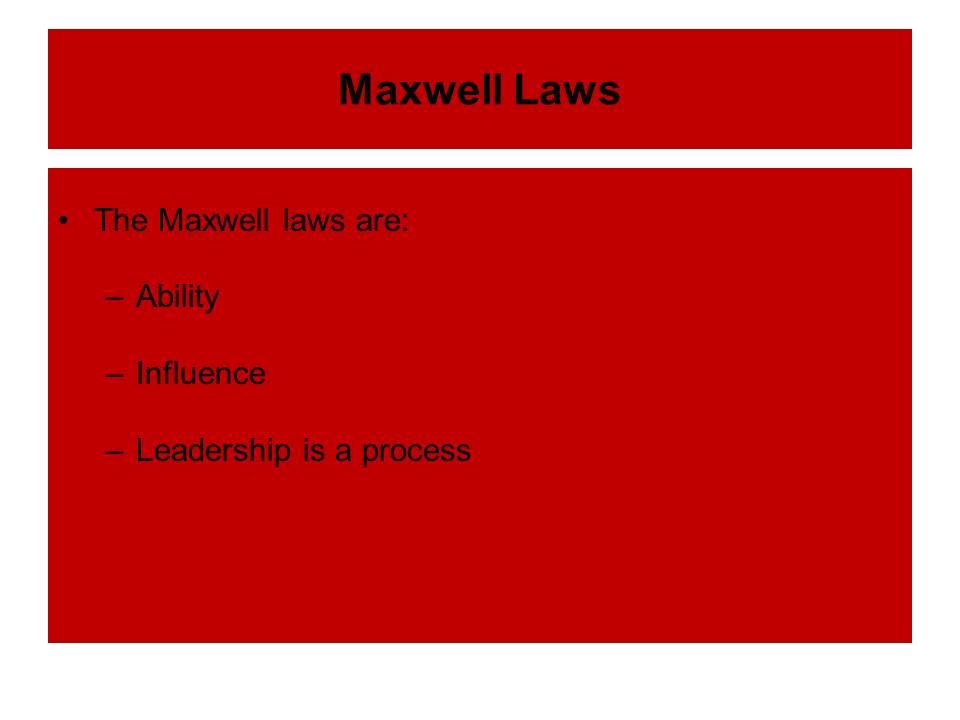
Demerits of technology
- Students’ exposure to bad information.
- Moral decay.
- Over reliance on technology.
- Advanced technology can cause health concerns.
- Environmental pollution (Khosrowpour, & Information Resources Management Association International Conference, 2000).
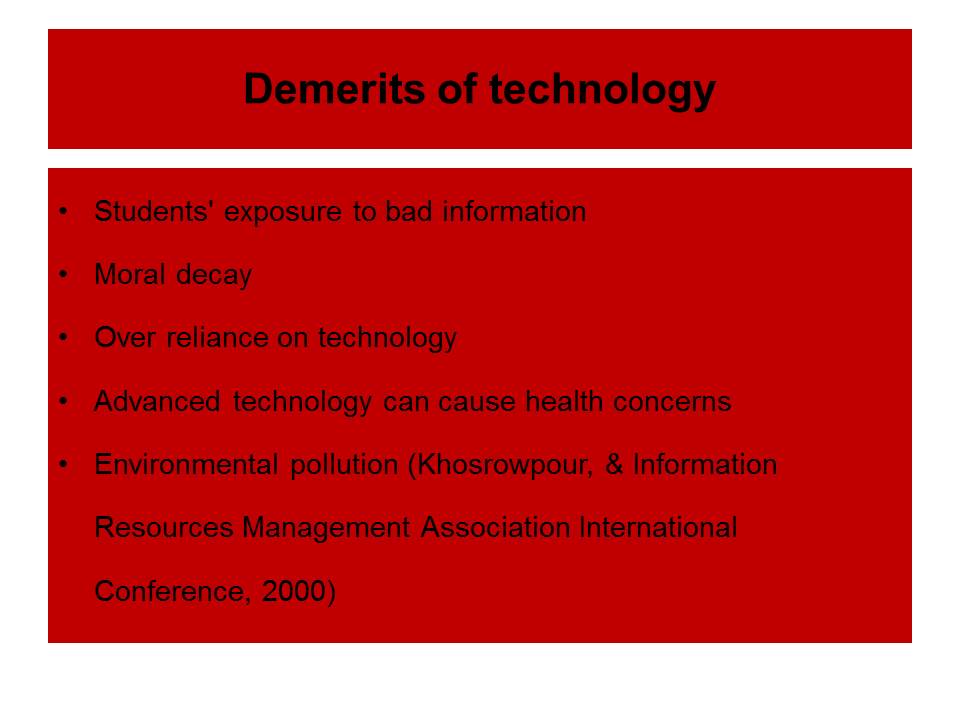
Conclusion
- Technology management should balance merits and demerits.
- Head of schools is responsible for the change.
- Leaders should be proactive.
- Investment in ICT infrastructure is critical.
- Successful ICT implementation depends on leadership.
- Leadership antiques and technology are close.
- School heads have shied away from being proactive.
- They have left the role to teachers.
- Thus, technological advancement has retarded.
- School heads should take full responsibility.
- Technology will aid in education success.
Therefore, technology management should seek a balance between the advantages and drawbacks. The heads of the academic discipline should be aware that, they are bestowed with the key responsibility to enact the change. This can only be achieved through visionary and proactive leadership skills in order to bridge the gap that can result if technology is not well managed. This notion supports the argument that even though investment in ICT infrastructure is critical, effective ICT technology leadership is equally crucial for successful ICT project implementations. The bridge between appropriate leadership antiques and technological advancements is thus very close and vital. However, the last decade has witnessed a gap between ICT support and leadership in schools. Head teachers have shunned away from taking proactive roles in the leadership of ICT technologies within schools. Instead, they have left this noble role to be taken up by small groups of teachers together with people falling in the realm of middle management.
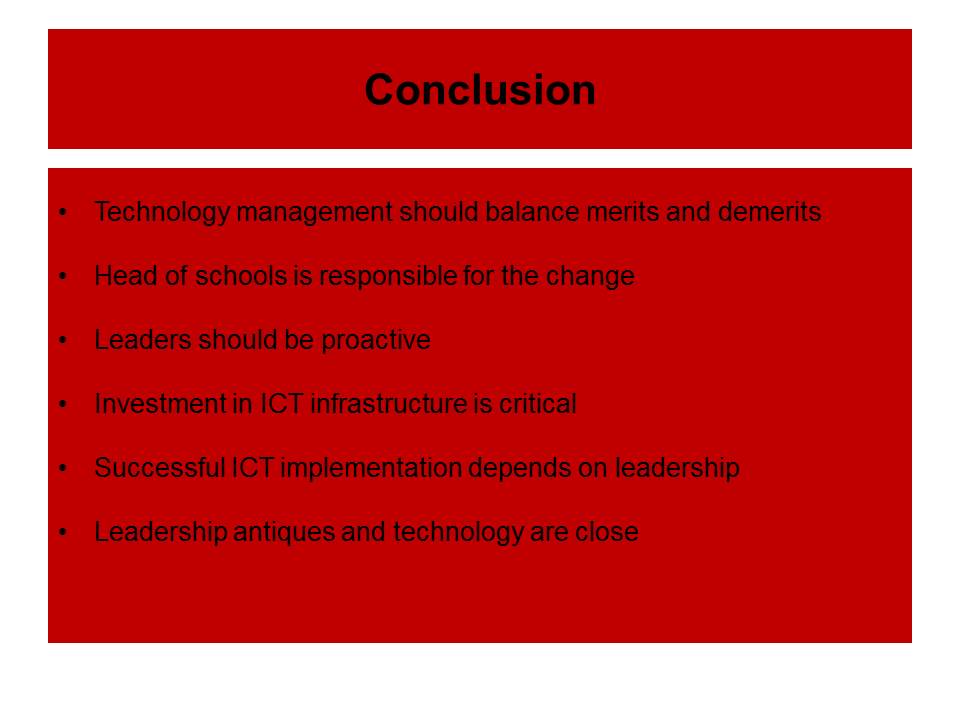
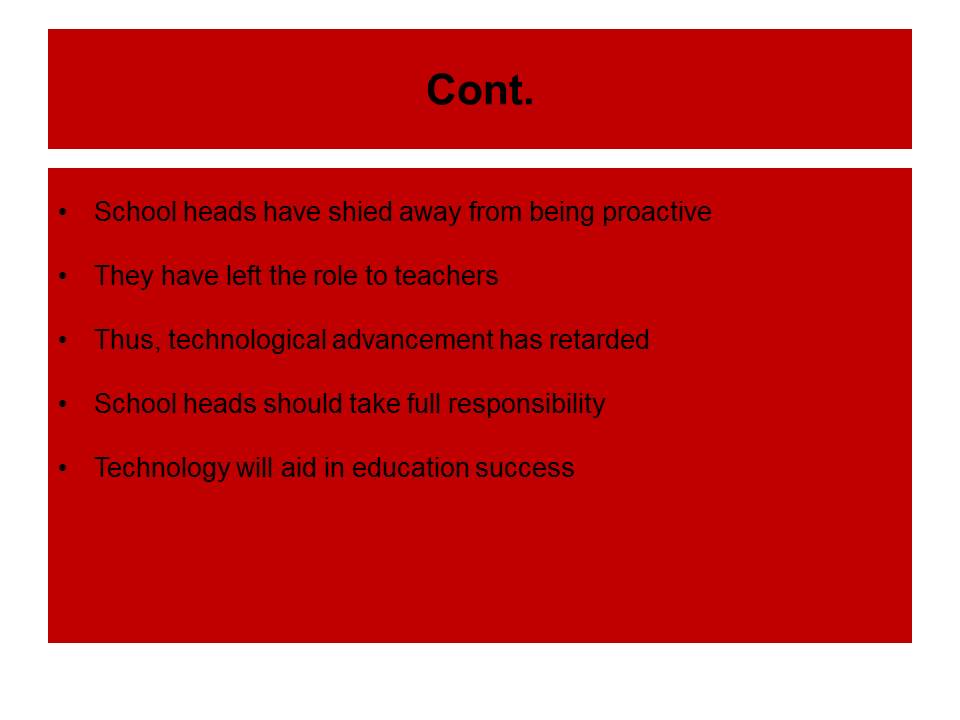
References
Abdallah, S., & Albadri, F. (2011). ICT acceptance, investment and organization: Cultural practices and values in the Arab world. Hershey, PA: Information Science Reference.
Akbaba-Altun, S. (2006). Complexity of Integrating Computer Technologies into Education in Turkey. Educational Technology and Society, 5 (3), 367- 380.
Byrappa, K., & Ohachi, T. (2002). Crystal growth technology. Norwich, N.Y: William Andrew Publishing.
Griffin, R. W. (2012). Fundamentals of management. Mason, OH: South-Western Cengage Learning.
Hinostroza, E., Guzmán, A., & Isaacs, S. (2002). Innovative uses of ICT in Chilean Schools. Journal of Computer Assisted Learning, 18 (2), 459-469.
HubPages Inc. (2012). Network Topology and Types of Network Topology. Web.
Kozma, R. (2005). National Policies that Connect ICT-Based Education Reform to Economic and Social Development. Human Technology,5(4), 358-367.
Maxwell, J. C. (2007). The 21 irrefutable laws of leadership: Workbook : follow them and people will follow you. Nashville, Tenn: Thomas Nelson.
Morris, K. (2012). Integrating Technology in the Primary Classroom. Web.
Khosrowpour, M., & Information Resources Management Association International Conference. (2000). Challenges of information technology management in the 21st century: 2000 Information Resources Management Association International Conference, Anchorage, Alaska, USA, May 21-24, 2000. Hershey, Pa. [U.a.: Idea Group Publishing.
MOUSE. (2012). Empowering Students to Succeed in Today’s Information Society. Web.
Noorbergen, R. (2001). Secrets of the lost races: New discoveries of advanced technology in ancient civilizations. Brushton, N.Y: TEACH Services
The George Lucas Educational Foundation. (2012). Core Strategy: Technology Integration. Web.
Weisz, T. (2012). How To Properly Integrate Classroom Technology. Web.